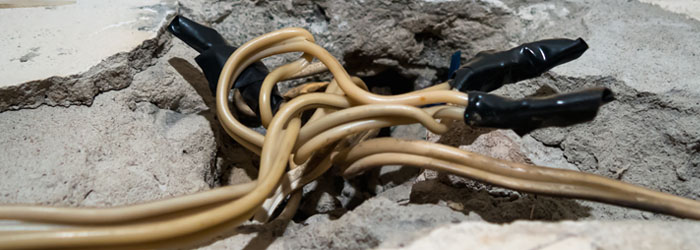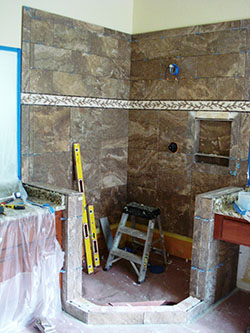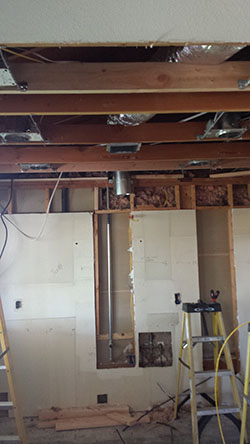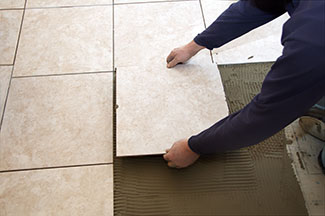Should You Buy a Flipped House?
 19 April 2017
19 April 2017 

What buyers – and responsible flippers – need to know
Not long ago, I visited a Scottsdale house sold by a so-called "flipper," who did a major remodel. Load-bearing walls were removed to open up the floor plan. The kitchen was redone, too, which led to relocation of a gas meter. Critical parts of the work did not meet building code requirements. None was done with a permit.
 Then an associate told me about a flipped home with three bathrooms redone with beautiful tile work. Within a year, tiles started peeling off in two bathrooms because no shower pan liners were used. The owners had to put five years-worth of savings into fixing the showers.
Then an associate told me about a flipped home with three bathrooms redone with beautiful tile work. Within a year, tiles started peeling off in two bathrooms because no shower pan liners were used. The owners had to put five years-worth of savings into fixing the showers.
In a 1950s-era home in Mesa, buyers said much of the new plumbing installed by a flipper needed a redo. When that job started, they found the new electrical work didn't meet code either.
That's typical of what can happen when a home is flipped – sold for the second time in a year with some remodeling to make it more salable. Sometimes those homes are remodeled the right way and sometimes not.
Now flipping is catching on again. An online real estate database, Realtytrac, reported recently that in 2016, about 193,000 single family homes and condos were flipped in the U.S. – the most since 2006 when 276,067 single family homes and condos were flipped.
Some of the hottest flipping spots were cities in Tennessee, California and Florida, where almost 10 percent or more of all homes sold were flipped. But Phoenix was right up there in the second tier of flippers with 8 percent of all homes sold.
One popular area for Phoenix metro flippers is the 85018 zip code, including the Camelback and Arcadia neighborhoods, which had 100 flips in 2016 with an average gross profit of $138,750 per house. That's not all bad news, of course. After all, attractively and properly remodeled homes can help raise the value of homes in a neighborhood, but it also means the area becomes less affordable.
Maybe you've wondered about doing a flip yourself. Buy a home that needs repainting, new appliances, new kitchen cabinets. Resell while the market stays hot. But remember that when you hear about "average gross profit," that just compares the purchase price and the sales price of the flipper. It doesn't include the cost of the flipper's remodeling, labor and material.
Here are basics to remember when buying a flipped house or if you're a potential "flipper" planning to remodel a house and resell.
For buyers of flipped houses:
1 | Ask about the history of the house.
 A Realtor can tell you all about who owned it last and what was changed recently. You'll be provided with a property disclosure statement. Trusting that is OK, but verifying all of it is more important.
A Realtor can tell you all about who owned it last and what was changed recently. You'll be provided with a property disclosure statement. Trusting that is OK, but verifying all of it is more important.
2 | Ask to see building permits for any large remodeling projects and have home and roofing inspections done.
Did someone change a carport into a garage or a patio or garage into a bedroom? Verify everything with the building department. If permits were pulled, were they pulled by a licensed contractor who is still in business? If permits were pulled by an individual, request a list of all subcontractors and material suppliers.
3 | Do lots of snooping yourself.
Look under sinks and out in the garage to check the plumbing. Look inside the electrical box. Ask what was done to plumbing and electrical systems. Open windows and cabinets; check inside closets.
4 | Put contingencies into the contract about any parts of the house that concern you.
Insist that the flipper fix or repair what doesn't suit you.
5 | Get all warranty information.
If new appliances and new air conditioners were installed, get manuals and warranty information to verify that all the new stuff is really new.
For responsible seller-flippers:
1 | Be realistic about profits and sales price.
Study the neighborhood and market carefully; be realistic about profits and about what the sales price will be. Resolve to remodel the right way.
2 | Make sure everything is completed to code.
 All work or repairs done on the property must be up to code and done with a building permit if necessary.
All work or repairs done on the property must be up to code and done with a building permit if necessary.
3 | Make sure your home service provider is licensed.
Be especially careful about what you do to the plumbing and electrical and HVAC systems in the house. Make sure you always hire licensed plumbers and electricians. Have any changes inspected by the city or county.
4 | Don't make additions you might regret later.
One area of the house that's vulnerable is the covered patio that many Arizona homes have at the back of the house. It looks easy to slap walls around the sides of the roof to build another bedroom. But if it's not done properly, these former patios can flood if you don't raise them up to the grade of the rest of the home.
Sellers and real estate agents should realize that a flip that is done right can be a benefit for the neighborhood as well as the buyer of a house.
###
Photo Credits:
RELATED CONTENT:
- Blog: Are Open Kitchens About To Close Up Again?
- Blog: Are There Nightmares Hidden In That Dream House
- Blog: Update your kitchen with new lighting!
- Podcast: Is The Open Kitchen Concept On It's Way Out?
- DIY Q&A: What Should I Look Out For In Purchasing A Flipped Home?
Print this page
recent post
- Duck, Duck, Duct! How Often Should Ductwork Be Cleaned?
- Vinyl vs. Fiberglass Windows: Which Is The Better Choice Of Replacement Window?
- We May Be The Grand Canyon State, But The Rocky Mountains Are Important For Arizona
- Welcome to Arizona! Things A Newbie to Arizona Should Know
- The Pros & Cons of Buying A Flipped House
- Getting In On The Ground Floor
- Why It’s More Critical Than Ever To Get Your AC Serviced Before Summer
- The Reality of Remodeling
- What To Look For When Comparing Your Roofing Quotes
- What To Expect When Buying New Windows & Doors
